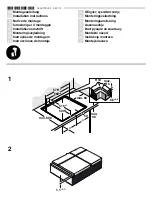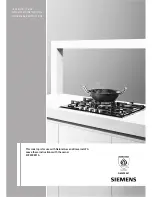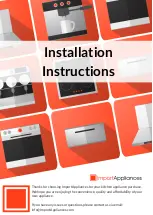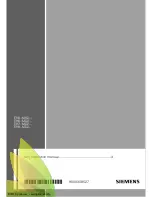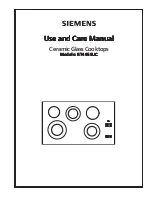
6
IMPORTANT SAFETY INSTRUCTIONS
• DO NOT TOUCH SURFACE UNITS, AREAS
NEAR THESE SURFACES, OVEN HEATING
ELEMENTS OR INTERIOR SURFACES.
Surface
units may be hot even though they are dark in
color. Areas near surface units may become hot
enough to cause burns. During and after use,
do not touch, or let clothing or other
fl
ammable
materials touch these areas until they have had
su
ffi
cient time to cool. Among these areas are
the cooktop, surfaces facing the cooktop, the
oven vent openings and surfaces near these
openings, oven door and window.
•
Wear Proper Apparel. Loose-
fi
tting or hanging
garments should never be worn while using
the appliance.
Do not let clothing or other
fl
ammable materials contact hot surfaces.
Never use your appliance for
warming or heating the room.
•
Do Not Use Water or Flour on Grease Fires.
Smother the
fi
re with a pan lid, or use baking
soda, a dry chemical or foam-type extinguisher.
•
When heating fat or grease, watch it closely.
Fat
or grease may catch
fi
re if allowed to become too
hot.
•
Use Only Dry Potholders. Moist or damp
potholders on hot surfaces may result in burns
from steam.
Do not let the potholders touch hot
heating surface units. Do not use a towel or other
bulky cloth instead of a potholder.
•
Do Not Heat Unopened Food Containers.
Buildup of pressure may cause the container to
burst and result in injury.
IMPORTANT—Do not attempt to operate the
appliance during a power failure. If power fails,
always turn o
ff
the appliance.
If the appliance is
not turned o
ff
and the power resumes, it will begin
to operate again. Once the power resumes, reset
the clock and oven function.
IMPORTANT INSTRUCTIONS FOR USING
YOUR COOKTOP
•
Know which knob controls each surface
heating unit.
Place a pan of food on the unit
before turning it on, and then turn the unit o
ff
before removing the pan.
•
Use proper pan size.
This appliance is equipped
with one or more surface units of di
ff
erent sizes.
Select utensils having
fl
at bottoms large enough
to cover the surface unit. The use of undersized
utensils will expose a portion of the surface
heating unit to direct contact and may result in
ignition of clothing. Proper relationship of utensil
to the surface unit will also improve e
ffi
ciency.
•
Utensil handles should be turned inward and
not extend over adjacent surface units.
To
reduce the risk of burns, ignition of
fl
ammable
materials, and spillage due to unintentional
contact with the utensil.
•
Never leave surface units unattended
—
Boilovers cause smoking and greasy
accumulations that may ignite, or a pan that has
boiled dry may melt.
•
Glazed cooking utensils
—Only certain types of
glass, glass/ceramic, ceramic, earthenware, or
other glazed utensils are suitable for rangetop
service without breaking due to the sudden
change in temperature. Check the manufacturer’s
recommendations for cooktop use.
IMPORTANT INSTRUCTIONS FOR USING
YOUR OVEN
•
Use Care When Opening an Oven Door or
a Warmer Drawer
—Stand to the side of the
appliance when opening the door of a hot oven.
Let hot air or steam escape before you remove or
replace food in the oven.
•
Keep Oven Vent Ducts Unobstructed.
The oven is
vented at the at the center trim above the oven.
Touching the surfaces in this area when the oven
is operating may cause severe burns. Also, do
not place plastic or heat-sensitive items near the
oven vent. These items could melt or ignite.
NEVER cover any slots, holes or
passages in the oven bottom or cover an entire
rack with materials such as aluminum foil.
Doing
so blocks air
fl
ow through the oven and may cause
carbon monoxide poisoning. Aluminum foil linings
may trap heat, causing a
fi
re hazard.
•
Placement of Oven Racks.
Always place oven
racks in desired location while oven is cool.
Remove all utensils from the rack before removing
rack. If rack must be moved while oven is hot, use
extreme caution. Use pot holders and grasp the
rack with both hands to reposition. Do not let pot



























